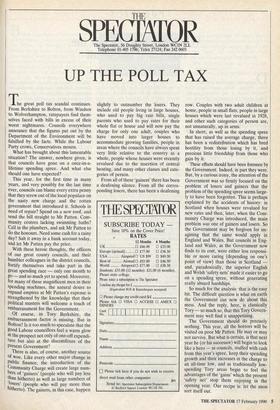SPECTAT mE OR The Spectator, 56 Doughty Street, London WC1N 2LL
Telephone 01-405 1706; Telex 27124; Fax 242 0603
UP THE POLL TAX
he great poll tax scandal continues. From Berkshire to Bolton, from Windsor to Wolverhampton, ratepayers find them- selves faced with bills in excess of their worst nightmares. Councils everywhere announce that the figures put out by the Department of the Environment will be falsified by the facts. While the Labour Party crows, Conservatives mourn.
What has brought about this lamentable situation? The answer, nowhere given, is that councils have gone on a once-in-a- lifetime spending spree. And what else should one have expected?
This year, for the first time in many years, and very possibly for the last time ever, councils can blame every extra penny that they screw out of the local populace on the nasty new charge and the rotten government that introduced it. Schools in need of repair? Spend on a new roof, and send the bill straight to Mr Patten. Com- munity centres lacking swimming baths? Call in the plumbers, and ask Mr Patten to do the honours. Need some cash for a rainy day? Salt it away in a bank account today, and let Mr Patten pay the price.
With these heroic thoughts, the officers of our great county councils, and their humbler colleagues in the district councils, fortify themselves and take part in the great spending race — only one month to
-- and so much yet to spend. Moreover, for many of these magnificent men in their Spending machines, the natural desire to expand empires at Mr Patten's expense is strengthened by the knowledge that their Political masters will welcome a touch of embarrassment for the Government.
Qf course, in Tory Berkshire, the embarrassment factor is missing. But in Bolton? Is it too much to speculate that the good Labour councillors feel a warm glow at the prospect not only of one-off expendi- ture but also at the discomfiture of the present Government?
There is also, of course, another source of woe. Like every other major change in Public finance, the introduction of the Community Charge will create large num- bers of 'gainers' (people who will pay less than hitherto) as well as large numbers of losers' (people who will pay more than hitherto). The gainers, in this case, happen slightly to outnumber the losers. They include old people living in large houses, who used to pay big rate bills, single parents who used to pay rates for their whole flat or house and will now pay the charge for only one adult, couples who have moved into larger houses to accommodate growing families, people in areas where the councils have always spent very little relative to the country as a whole, people whose houses were recently revalued due to the insertion of central heating, and many other classes and cate- gories of person.
From all of these 'gainers' there has been a deafening silence. From all the corres- ponding losers, there has been a deafening
row. Couples with two adult children at home, people in small flats, people in large houses which were last revalued in 1928, and other such categories of person are, not unnaturally, up in arms.
In short, as well as the spending spree that has raised the average charge, there has been a redistribution which has bred hostility from those losing by it, and precious little friendship from those who gain by it.
These effects should have been foreseen by the Government. Indeed, in part they were. But, by a curious irony, the attention of the Government was so firmly focused on the problem of losers and gainers that the problem of the spending spree seems large- ly to have been forgotten. This is perhaps explained by the accidents of history: in Scotland when houses were revalued for new rates and then, later, when the Com- munity Charge was introduced, the main problem was one of gainers and losers. So the Government may be forgiven for im- agining that the same would apply in England and Wales. But councils in Eng- land and Wales, as the Government now finds to its cost, were either less responsi- ble or more caring (depending on one's point of view) than those in Scotland — and, paradoxically, the superior English and Welsh 'safety nets' made it easier to go on a spending spree, without generating really absurd hardships.
So much for the analysis: that is the easy bit. The difficult question is what on earth the Government can noW do about this mess. And the reply, here, is classically Tory — so much so, that this Tory Govern- ment may well find it unappetising.
The Government should do precisely nothing. This year, all the horrors will be visited on poor Mr Patten. He may or may not survive. But what is certain, is that next year he (or his successor) will begin to look like a hero — as councils, stuffed with cash from this year's spree, keep their spending growth and their increases in the charge to an all-time low, and as traditionally low- spending Tory areas begin to feel the advantages of the 'gains' which the present 'safety net' stop them enjoying in the opening year. Our recipe is: let the mess sort itself out.


















































 Previous page
Previous page